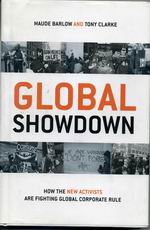
Global Showdown
How the New Activists are Fighting Global Corporate Rule
Barlow, Maude; Clarke, Tony
Publisher: Stoddart
Year Published: 2001
Pages: 237pp ISBN: 0-7737-3264-0
Library of Congress Number: HF1385.B37 2001 Dewey: 382'.92
Resource Type: Book
Cx Number: CX11595
Documents the new forces of resistance and invitates readers to join the struggle for alternatives.
Abstract:
Unregulated free market capitalism, heralded as a great American triumph, has caused millions to be out of work, billions to lack the basic necessities of life, and widespread environmental destruction. Maude Barlow and Tony Clarke's Global Showdown describes a movement of resistance that has resulted from the conditions brought about by the spread of capitalism. This civil society movement is composed of activists from many smaller groups around the world that are opposing what Barlow and Clarke identify as the "global corporate government."
Since the 1980s, the role of governments in the world, and particularly in developing countries, has continually diminished as they advanced corporate interests instead of their citizens' interests, and surrendered control of their economies to global economic institutions such as the World Trade Organization (WTO) and the World Bank. According to Barlow and Clarke, organizations like the WTO effectively have legislative, judicial, and executive powers stronger than those of many of their participant nations, and they use these powers to advance the interests of corporations. This is the "global corporate government" whose actions destroy the environment, negatively affect food security and food safety (e.g. GM foods), limit the influence of other organizations, and are expanding the range of military operations (including into space). Thanks to them, corporations now control resources, such as air and water, formerly considered part of "the commons."
But those who are part of the civil society movement are fighting back. They believe that everyone should have the right to "the commons." They are advancing economic rights in the developed and developing world. In the form of groups like Greenpeace they are defending the environment. They also fight for social rights such as education, health care, and social security. Only through organized global action and the growth of the civil society movement can abusive corporate profiteering be counteracted.
[Abstract by Oliver Mao]
Table of Contents
Acknowledgements
Introduction
1 Seattle Showdown
2 Militant Roots
3 Dismantle Democracy
4 Global governance
5 National Collusion
6 Protecting Essentials
7 Defending Humanity
8 Citizens' Agenda
9 Democratic Control
10 Global Mobilization
Suggested Reading
Index
Subject Headings


